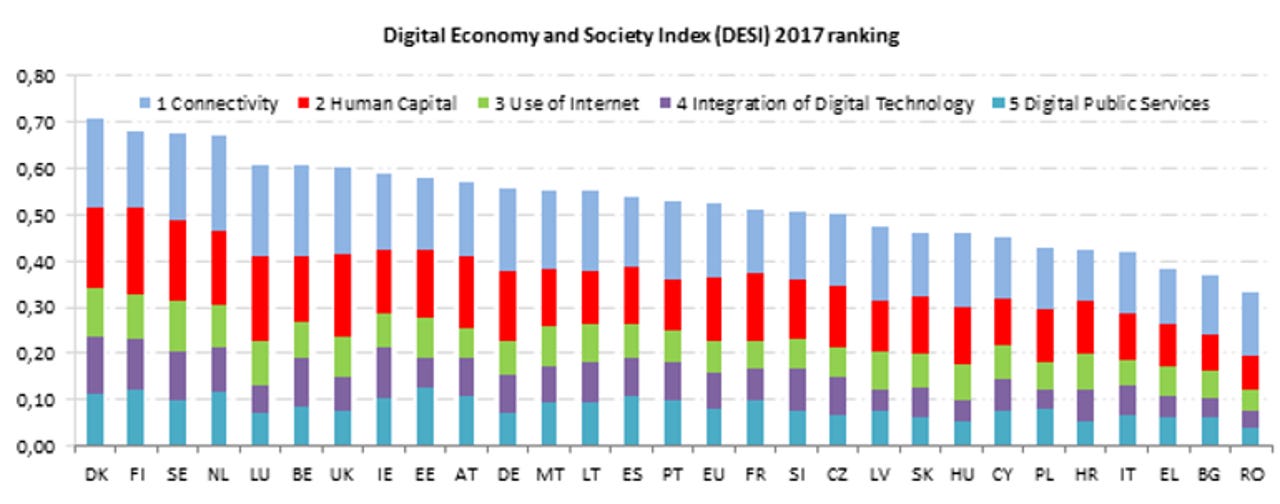Broadband access: Netherlands wins but there are surprising losers in EU rankings

Denmark, Finland, Sweden, and the Netherlands have the most advanced digital economies in the EU followed by Luxembourg, Belgium, the UK and Ireland.
Demand for mobile services may be contracting, but the Netherlands has emerged in a new report as the European Union country with the fastest mobile and fixed broadband, and the most widespread access to broadband last year.
However, on a gloomier note, according to the same recent European Commission Digital Economy and Society Index (DESI) report, 44 percent of Europeans still lacked basic digital skills, while less than half of small and medium-sized businesses sold their products or services to another European country.
The EC publishes the report annually to track how well member-state economies are adapting to digital technology, which it reckons is key to economic competitiveness and the cornerstone of the digital single market.
Broadband connectivity refers to the infrastructure of high-speed internet access available in each country. The EC defines high-speed fixed broadband connections as those that provide their users with at least a 30Mbps bandwidth, and high-speed mobile broadband connections as ones that take place across a 4G network.
The Netherlands ranked first in broadband connectivity, followed by Luxembourg and Belgium. In those countries, services that use broadband are universal, and mobile broadband access is fast.
But the Netherlands' ubiquitous, high-speed broadband connections have not reversed the declines in the Dutch cellular market.
According to Telecompaper, Dutch mobile revenues fell by four percent in 2016, following two years of steady declines. In 2015, the Dutch mobile market contracted by 3.3 percent and by 7.5 percent in 2014.
The decreases may be partly due to consumers using more messaging and video apps on their devices, sometimes choosing Wi-Fi over 4G connections to avoid the extra costs associated with exhausting their monthly data bandwidth allocations from their cellular providers.
Apart from broadband connectivity, the EC report ranked each of the EU's member states against four other criteria: digital workforce skills, internet usage, digital technology integration success, and the availability of digital public services.
Across all of the DESI indicators, the Netherlands ranked fourth, behind Denmark, Finland, and Sweden.
The UK placed seventh, and Germany ranked 11th, both above the EU average. Meanwhile, France scored lower than the EU average, at sixteenth place.
Germany's digital economy showed the smallest gains across the DESI indicators in 2016, while Slovakia and Slovenia improved the most.
Despite playing the role of European landlord to the world's largest tech companies, Ireland did not place in the top three countries with the most advanced digital economies, sitting behind the UK at number eight.
However, Ireland ranks second in how well its industries have integrated digital technology, behind Denmark and before Finland, whose businesses the EC describes as the "most advanced".
The Netherlands might improve its standing in the DESI by improving how well its businesses integrate digital technology, the EC says.
"The digitization of public services is among the most advanced in the EU while the country's challenge is to improve the take-up of technology by business, although already above the EU average," the report says of the Netherlands' digital economy.
Developing e-commerce, using electronic invoices, instituting enterprise software, and engaging consumers with social-media tools are some approaches that the DESI report cites that the Netherlands could use to bring its industry further into the digital economy.
Read more on broadband
- Fiber broadband: Is it a waste with 5G and Elon Musk's satellites on the horizon?
- Proper fibre broadband is not a waste, but you need a little socialism to do it properly
- Londoners can now get same-day broadband, but does Relish have a future?
- ISPs should be more accurate about broadband speeds: ACCC
- New report shows most people still hate their broadband provider (TechRepublic)
- Broadband declared a basic service in Canada (CNET)